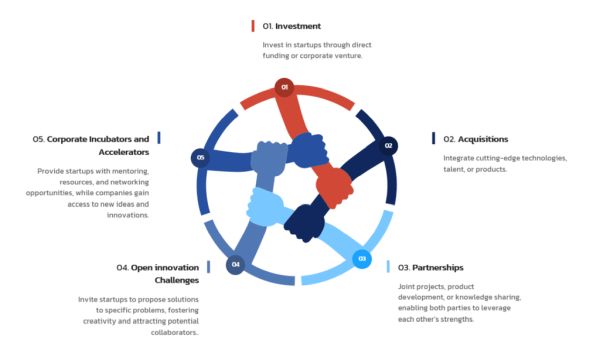Over the past decade, the Indian startup ecosystem has witnessed a remarkable upswing in funding and valuation, driven by innovation and collaboration. Across a spectrum of industries, startups have ingeniously leveraged technology tailored to local requisites, reaping rewards from India's expansive market opportunities. This evolution has attracted proactive engagement from venture capital firms, angel investors, and global stakeholders, who not only inject funding but also foster mentorship and facilitate market entry, nurturing the growth of enterprising individuals.
In a typical scenario, industries and academic institutions seek to form partnerships with startups in order to tap into their expertise. India has undergone a significant transformation in recent times due to the growing innovation and collaboration between startups and established enterprises. This collaboration holds immense promise for both sides, as startups contribute innovation, flexibility, and fresh concepts, while well-established corporations offer resources, industry know-how, and avenues to the market. This synergy harnesses the strengths of various stakeholders, fostering a culture of innovation that paves the way for pioneering breakthroughs and technological advancements.
Innovation and Collaboration in Startup-Company Partnerships: Exploring Diverse Approaches

Finding the correct startup to invest in, acquire, or partner with to develop new technologies and intellectual property presents some usual challenges for industries, such as:
- Finding companies that are relevant to your personal goals and areas of interest is a common difficulty, as startups are distributed across multiple industries, phases of growth, and geographic locations.
- Companies can be overwhelmed by the availability of startups and data, making it difficult to select those that correspond with their innovation and collaboration objectives and commercial goals. Due to a lack of centralized information and resources, the identification procedure may be hard and time-consuming.
- Since not all businesses have a high level of awareness, it may be necessary to conduct proactive research and network to find undiscovered gems to uncover firms with unique technology or solutions.
- The startup ecosystem is dynamic and changing quickly. Staying current with industry news and developments is a laborious task.
- Startups are typically new, with no track record or reputation. Businesses and R&D groups may be hesitant to cooperate with startups due to concerns about their dependability, ability to deliver, or ability to protect their intellectual property.
- Startups may not necessarily have development paths, strategic goals, or technical focus areas that align with the needs of collaborating partners. An examination of their existing networks and collaborations with others can provide insight into the types of partners with whom they have previously collaborated.
Conquering these barriers is essential for reaching your objectives and forging enduring partnerships. Industries endeavor to accomplish this by implementing various initiatives, such as:
- Clearly outlining the aim to achieve through innovation and collaboration and identifying the specific areas where they need expertise, which in turn helps to target the right startups, companies, or academics.
- Implementing advanced data analytics tools can help companies sift through the vast amount of information and identify startups that match their innovation requirements. Machine learning algorithms can streamline the process and provide data-driven insights.
- Locate the startups not only through their published intellectual property but also through their research output and news websites.
- Businesses might create open innovation challenges to recruit startups with new solutions to specific problems. These challenges give startups a platform to demonstrate their ideas, while also helping companies to find possible collaborators.
- Trends and incoming companies in the same technological sector should be monitored to help uncover relevant businesses much sooner.
- Seek out startups that are actively working with universities and research organizations to create new technology. This in turn shows that the companies are flexible in their growth and strategic goals and receptive to cooperation.
- Make use of your professional network and ask industry professionals, investors, and enablers of the startup ecosystem for recommendations.
By addressing the issues and putting some strategies into practice, industries might enhance the ability to recognize startups for collaboration, promote creativity, and establish win-win alliances that progress technical innovation.
All these tasks can be very smoothly achieved by using a centralized web platform to find entrepreneurs in a certain domain both locally and internationally.
Unlock new horizons with innosabi Insight, the innovation intelligence software that illuminates fresh markets and opportunities for R&D and IP professionals. Discover through a personalized Questel demo – Reserve your session now!
Yogesh Kardame is a Customer Success Consultant at Questel.
The content of this article is intended to provide a general guide to the subject matter. Specialist advice should be sought about your specific circumstances.
